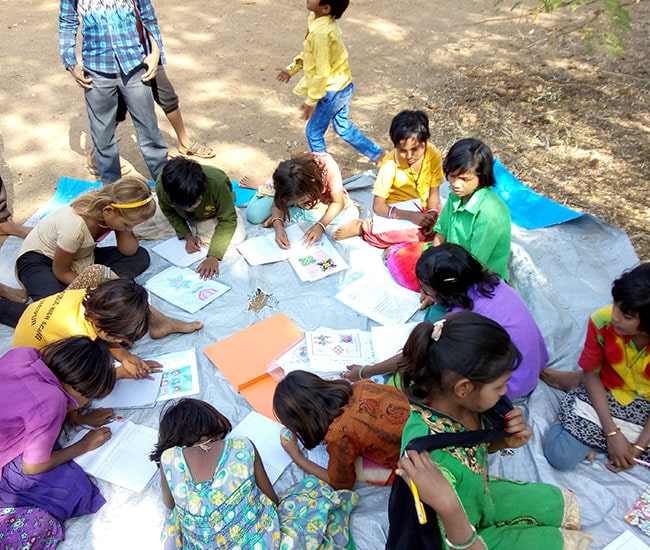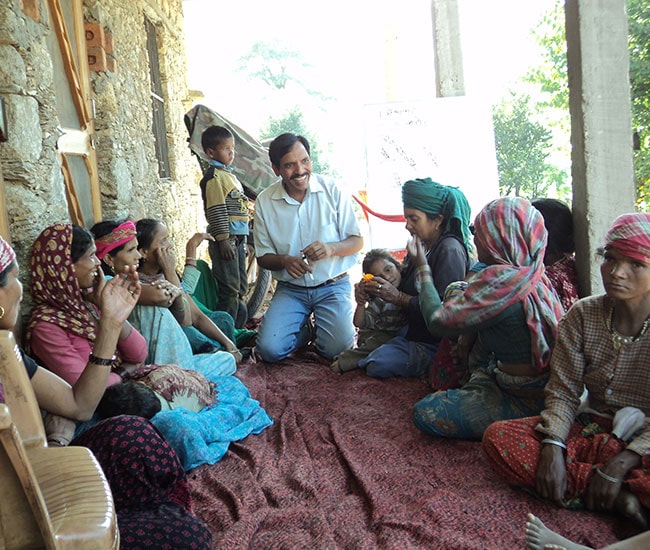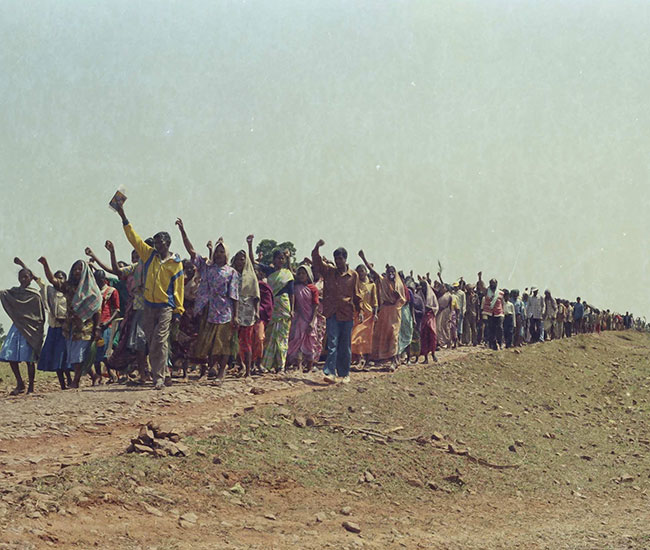
Shoshit Kamgar Sangathana
The Shoshit Kamgar Sangathana was founded by Pandurang in 1999 and has been working on issues of PDS, NREGA, health and education in two blocks in Latur district. After working in a sangathan in Pune for three years, Pandurang came to the conclusion that this was the way to fight against poverty and injustice. He returned to his hometown and started running night schools for the children of bonded labour. He also actively participated in the Campaign for Human Rights in the movement against caste-based atrocities. This earned him and his associates the reputation of a group that “instigates people”. They stood up to the rich and powerful and showed that it was possible for the so called weaker sections of society to raise their voice against exploitation and discrimination. One of the turning points was the way in which they took over the Tehsildar’s office for 3 days to demand that the administration implement the state government’s Employment Guarantee Scheme (EGS Training in Nilanga) properly.
These experiences prepared the ground for the Shoshit Kamgar Sangathana to come into being. The sangathan decided to take up those issues that are most important to the lives of ordinary people – food, employment and education. There were already government schemes such as PDS, NREGA and scholarships in place for the benefit of the poor and the downtrodden, but the unwieldy and corrupt system was coming in the way of proper implementation. The sangathan undertook a systematic approach whereby they first collated all the information about a scheme, disseminated the information to the people in a form that was easy to understand, and then helped them claim their entitlements. Seeing that the sangathan was addressing their most pressing everyday problems, people began to trust the process and join the collective. The sangathan is now active in all the 54 villages in Shiroor Anantpal block and more than half of the 118 villages in Nilanga.
The sangathan noticed that PDS was not being taken up as an important issue even though it was related to the poor person’s basic need of food. They felt it is crucial and so began making interventions to make PDS more effective and accountable. In every village that the sangathan works, they have demanded (and in many cases ensured) that the correct rates, license number, timings, etc. be written clearly on the display board outside the ration shop, that the dealer gives receipts for all sales and keeps a complaint register. Using RTI, they have got the complete list of APL, BPL, Antulya and other categories of families and shared this information with the people, most of who did not know in which category they were placed. (PDS Battle in Senda Village) The Shoshit Kamgar Sangathan has also taken the initiative to form a Marathwada-wide group called the Samajik Nyay Andolan to tackle the PDS related issues in a bigger way.
The scholarship scheme for the socially disadvantaged girl child is another scheme that the sangathan has taken up in a major way to ensure proper implementation. (Scholarships for Girl Students) Apart from the obvious benefits of the scheme, the sangathan also sees this as a means of reaching out to children and initiate them into the process of politicization. The plan is to have sanagthans of students so that they get trained at a young age to identify and articulate their problems and seek solutions through collective action.
One of the greatest achievements of the sangathan has been the extent to which it has succeeded in mobilizing women to not only be participants in but leaders of social change. By forming the mahila sangathan exclusively for women and encouraging SHGs (SHG as a means of economic and political empowerment), the foundation has been laid for the next step i.e. capacity building of women to take up political leadership roles in the Gram Panchayat and Zila Parishad.
The sangathan has six main karyakartas, four in Shiroor Anantpal and two in Nilanga block. Each block has a Taluka committee with 1-2 representatives from each village. At the village level there are village committees and ration committees that take up local issues.
The expansion of the sangathan has been a steady process and the structure has evolved out of people’s needs. The effort has been to develop local leadership in a village to such an extent that they are not dependent on the main karyakartas to sort out their everyday problems. The karyakartas, in turn, are encouraged to take initiative rather than just execute a plan. Since they belong to the same milieu as the people they are working with, they face the same problems and have a good understanding of what the community’s primary concerns are.
One of the main challenges the sangathan is facing today is the diminishing youth participation in its activities. The young people of today seem to prefer becoming associated with political parties who woo them with money, food and drinks. In the long term, the sangathan aims to expand its reach to a district level, to involve the youth, to develop and enhance the common person’s decision making capacity, and to mobilise the poor to claim social, economic and political power.
Stories
EGS Training in Nilanga
In 1992, Pandurang and others in CHR came up with a bold move to take over the Nilanga Tehsildar’s office and hold an EGS training workshop there (the Employment Guarantee scheme in Maharashtra was a predecessor to NREGA). The aim was to force the administration to listen to the demands of the people who were not getting work under EGS because it was not being implemented properly. More than 30 people entered the office of the Tehsildar. They said they did not have any work and they had come to get their rights. They went ahead and conducted a thorough workshop on EGS for the people who had come from different villages. They explained the EGS law and the details of payment. Nobody dared to throw them out for three days. Finally a meeting was called in which the labourers and the administration participated. Their demand for an ID card for every worker was not met, but they did get the collector to give the labour requirement in writing.
PDS Battle in Senda Village
In Senda village in Shiroor Anantpal block, some irregularities in PDS came to light in May 2011 during a meeting of a women’s SHG. When the matter was investigated it was found that 35 families were not getting ration at the rate for which they were eligible because they did not know that their names were on the BPL/Antulya/Annapoorna list. The ration dealer had been cheating the people of the village for 20 years, selling rice, wheat and other essential commodities at 5-6 times the actual rate. Since the PDS monitoring committee was in cohorts with the dealer, none of the malpractices were being reported.
When the people came to know that they had been denied their due for so many years, they got very angry. They came together and raised their voice. The sangathan wrote down the complaints of the aggrieved parties, read it out to them, had them sign it and submitted it to the Tehsildar. When the concerned official visited the village, all the people spoke up in front of him and a panchnama was done. The dealer accepted that he was at fault and apologized in writing. He was warned that if ever a case of corruption is found against him in future, his license would be cancelled. This incident helped in mobilizing the entire village to become a part of the sangathan. Now they have formed a ration committee to ensure proper functioning of PDS in their village. The sangathan is also creating awareness about the BPL survey, how it ought to be done and what the questions mean.
Scholarships for Girl Students
In 1995, the government started the Savitri Bai Phule Scholarship scheme for girl school students from SC/ST backgrounds, giving Rs. 600 per year for students between 5 and 7, and Rs. 1000 per year for those between 8 and 10. Like most government schemes, this too became a means for corruption rather than that of encouraging education of girls from disadvantaged sections of society. The sangathan took up the cause in earnest and started investigating what was actually going on in schools. They found that in some cases the money had not been given to the girls for over 3 years. They created awareness and gave all the necessary information to the students, parents, teachers and head master.
Thanks to the sangathan’s efforts the scholarship money comes directly into the bank account of the student now. Earlier many headmasters were siphoning off the money, or if it reached the family, the girl’s father was spending it on drinks. The next step is to mobilize the children and families to demand that the scholarship amount be increased and also to include girls from classes 1 and 4 in the scheme.
SHG as a means of economic and political empowerment
The sangathan started helping women form savings groups in 2000. Each group decides a suitable monthly contribution depending on what the particular members can afford. Their monthly meetings become an ideal space not only to deal with the routine SHG matters but also to discuss other issues such as PDS, NREGA etc. Since it is mostly women who go to the PDS dealer, they are the ones who need to be given all the information regarding what is due to them and who can immediately point out irregularities.
Now there are 550 SHGs in Shiroor Anantpal and Nilanga, most of them for women in the 18-45 age group and a small percentage for women over 45. After one and a half years, the SHG gets eligible to apply for a loan for starting a small enterprise. About 385 SHGs have got a loan from the bank and are successfully running businesses on a shared profit basis.
The SHGs are run with seriousness and rigour, and are monitored and guided by the sangathan. This has helped them evolve into a crucial means of women’s economic and political empowerment. Traditionally women did not talk to men or speak up in public. The SHGs have encouraged them to move out of domestic spaces and increased their role in decision making. They now have more control over money and also greater awareness of the government schemes that they can avail for the welfare of their families and themselves.



